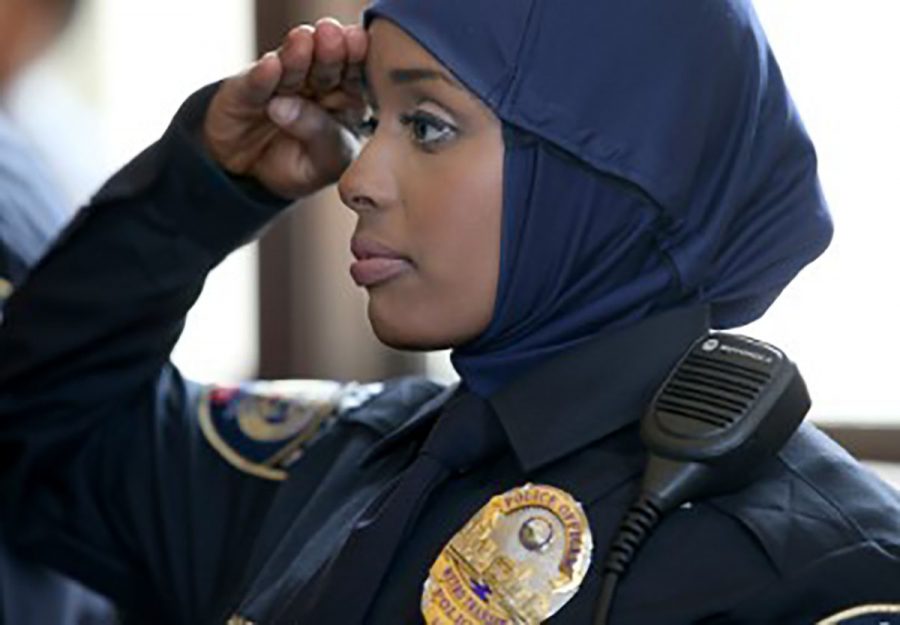Police departments begin to recognize the need to include religious practices in the force
UW-Madison and city police departments now allows Muslim women to wear hijabs on duty
More stories from Stephanie Smith
Photo by SUBMITTED
Kadra Mohamed is Minnesota’s first hijab wearing policewoman and the first Somali female officer. She is only 21 years old and already making history.
Throughout the world, police departments in some areas of certain states are slowly starting to get on board with letting their Muslim female officers wear hijabs while on duty.
Madison, Wisconsin has recently been added to the list of police departments that are permitting women to do so.
The hijab – a headscarf covering the head and neck but leaving the face clear – was approved after being requested by a number of Muslim women.
Both UW-Madison and city police say they would allow this as a move that sets them apart from other departments around the country that either do not allow officers to wear religious head coverings or do not have a clear policy on the matter.
According to UW-Madison Police Department’s spokesperson Marc Lovicott, the department does not “directly address the wearing of hijabs” but does allow for “uniform modifications” with the approval of the chief.
Thankfully the chief of the university’s police department said she would permit an officer to wear the hijab for religious reasons.
This new implementation could enable more Muslim women to consider a career in law enforcement.
These women should not have to erase the idea of working in the police force just because it does not allow them to openly practice their religion, and police Departments are finally beginning to see this.
Madison Police Department’s standard operating guidelines say that “scarves are allowed, as are head covers that are required for religious or medical purposes, with a Commander’s approval.” MPD spokesperson Joel DeSpain confirmed that the department is “tolerant of officers and their religious beliefs.”
Kadra Mohamed was Minnesota’s first hijab wearing policewoman and the first Somali female officer. St. Paul is also one of the few American police departments that allow women to wear the hijab while working.
There are millions of Muslim women like Kadra Mohamed, who want to achieve their goals. And it’s not their hijab that is holding them back, but outdated institutional prejudices.
Meanwhile, officers in Los Angeles, Philadelphia, Houston, Las Vegas, San Antonio and Columbus, Ohio are not allowed to wear hijabs on duty.
Most major American police departments are somewhere in the middle. In many cities, the issue simply hasn’t come up, or officers would need to get special approval to wear a hijab as part of their uniform.
In Chicago, the department’s 28-page uniform policy includes sections on the length of officers’ fingernails and which pins they can wear but makes no mention of hijabs or religious articles of clothing.
Officers requesting religious accommodations are handled on a case-by-case basis.
The Honolulu Police Department policy allows officers to wear floral leis “when part of an official ceremony or function,” but doesn’t have any reference to religious headwear.
As scrutiny has grown in the past few years over the lack of diversity in many U.S. police departments, Muslim community advocates say allowing the hijab is an important step toward inclusion.
The departments that ban the hijab for officers say they do so either for the officer’s safety—out of concern that a hijab could be grabbed during a struggle—or out of a desire for conformity in uniforms.
The departments that allow the hijab say they haven’t had any issues with safety. In Saint Paul, officers can wear a hijab that is specially modified to have metal clasps that allow it to come off in a struggle.
There’s also been controversy over police departments banning officers from wearing long beards, which some Muslim men view as part of their faith. After the NYPD suspended a Muslim officer for wearing too long a beard last year, his lawsuit led to an emergency hearing in his favor and he was quickly reinstated.
Religions and how people chose to practice them should all be taken into account with any career they are involved in. People should feel welcomed, wanted and respected in a workforce where they are allowed to participate in their religious traditions if they want to.
Forces need to be representative of the communities they serve and allow women to wear hijabs in order to show the women, community and rest of the police force their inclusivity. These women should be able to feel comfortable in wearing something that represents who they are and their religion at their workplace.
Although it is great that Madison is now allowing women to wear hijabs on duty, the rest of the U.S. needs to join in and promote religious freedom in the workforce.


Sauda • Dec 22, 2024 at 1:46 am
I love it. I am a Muslim Tailor, and I have started to make these pull apart Hijabs for my sister who is a Sheriff in Pennsylvania. Point of contact for anyone interested…Instagram: Fiji215